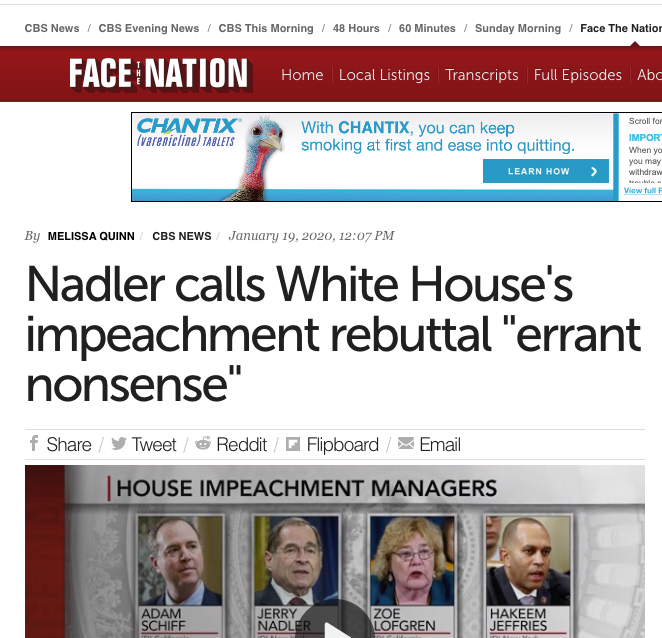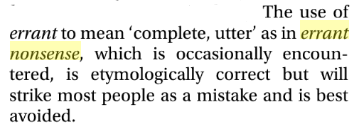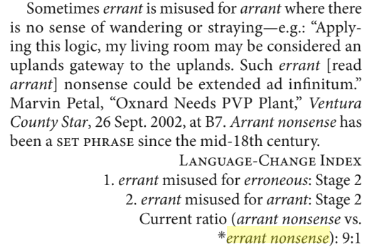Errant v. Arrant
« previous post | next post »
Several people have emailed me to point out an apparent malapropism in a CBS News online headline: Melissa Quinn, "Nadler calls White House's impeachment rebuttal 'errant nonsense'", Face the Nation, 1/19/2020. In current usage, this should probably be "arrant nonsense".
But curiously, arrant and errant are the historically the same word, with an interesting and tangled history.
The OED gives this etymology for arrant:
A variant of errant adj., ‘wandering, vagrant, vagabond,’ which from its frequent use in such expressions as arrant thief , became an intensive, ‘thorough, notorious, downright,’ especially, from its original associations, with opprobrious names. For the vowel-change compare arrand = errand , Harry = Herry , Henry , far n. = earlier fer, etc.
The OED's account of the word's semantic drift:
1. Wandering, itinerant, vagrant; esp. in knight arrant, bailiff arrant; in which the etymological errant adj. is now alone used.
2. In thief errant, arrant thief [= robber] originally an outlawed robber roving about the country, a freebooter, bandit, highwayman; hence, a public, notorious, professed robber, a ‘common thief,’ an undisguised, manifest, out-and-out thief.
3.a. Hence: Notorious, manifest, downright, thorough-paced, unmitigated. Extended from thief to traitor, knave, rebel, coward, usurer; after 1575 widely used as an opprobrious intensive, with fool, dunce, ass, idiot, hypocrite, Pharisee, Papist, Puritan, infidel, atheist, blasphemer, and so on through the whole vocabulary of abuse.
b. transferred of things, i.e. opprobrious deeds and qualities, theft, presumption, lie, device, etc.
The obligatory screen shot:

jin defang said,
January 19, 2020 @ 12:38 pm
I'd feel better if I thought the CBS headline writer was familiar with the common origin of arrant/errant. But I don't think s/he was. Another example of the deterioration of the English language.
[(myl) It's not hard to find other examples from well-respected authors, e.g. Jane Austen in Emma:




or BoingBoing:
Fowler (2015) has this to say:
And Garner (2016) says this:
So the headline was a mistake, but maybe this is not the best choice of topic for a jeremiad on the deterioration of the language…]
FM said,
January 19, 2020 @ 12:44 pm
Interestingly, Nadler, unlike most Americans, probably distinguishes these two words in pronunciation.
Rob Grayson said,
January 19, 2020 @ 2:00 pm
UK reader here. I’ve never heard of the “arrant” variant.
RP said,
January 19, 2020 @ 2:24 pm
@Rob Grayson,
I'm a UK reader too, and I've heard of it (and seen it and heard it).
I would consider "arrant nonsense" the standard spelling.
Gregory Kusnick said,
January 19, 2020 @ 3:24 pm
If one's only experience with the word "arrant" is in the phrase "arrant nonsense", one might be inclined to infer a connotation of "egregiously wrong", i.e. erroneous. This could account for the variant spelling.
Philip Taylor said,
January 19, 2020 @ 3:30 pm
Native speaker of <Br.E> here. I am familiar with both "knight(s) errant" and "arrant pedantry" (Churchill is alleged to have used the latter phrase).
Rahil said,
January 20, 2020 @ 3:50 am
I'm a Indian reader too, and I've heard of it
David Morris said,
January 20, 2020 @ 4:52 am
Google Ngrams shows that errant is used about 10 times as much as arrant. But searching for errant *_NOUN,arrant *_NOUN shows arrant nonsense, errant husband, arrant coward, errant child, errant ways, arrant knave, arrant cowards, arrant knaves, arrant fool, errant son, arrant thief, errant thoughts, arrant trifling, errant knight, errant wife, arrant thieves, errant knights, arrant folly and errant fancy – close enough to an equal mix. The usage of K/night(s) errant doesn't anywhere make up to 10 times the difference.
The first time I taught English in Korea, I had a student who gave his nickname as Herry. I asked him why he had chosen that name and he said that another teacher, a woman from the USA, had given it to him. When I spoke to her about him, I realised that she actually meant Harry – a combination of her particular USA accent and the fact that Korean doesn't have a direct equivalent of 'a', but closer to 'e'.
Phillip Helbig said,
January 20, 2020 @ 5:25 am
The quote from Austen reminded me of an interesting experience. I once attended a performance (mostly spoken word, some music) by Ashley Hutchings (how about a post on unisex names, when Shirley stopped being a male name, and so on?) where he mentioned that for some re-releases of albums he had written liner notes in the style of Austen, Hardy, Dickens, etc. He read some samples. Even after just a sentence or two, most of the audience could spot the intended role model. He said that after one show someone had come up to him and said that they were deeply disturbed that he was able to write like Jane Austen.
Doug said,
January 20, 2020 @ 7:13 am
Perhaps 40 years ago, my English class read a poem, "The Pitcher," by Robert Francis, containing the lines:
[i]The others throw to be comprehended. He
Throws to be a moment misunderstood.
Yet not too much. Not errant, arrant, wild,
But every seeming aberration willed.[/i]
The poet presumably intended a distinction between "errant" and "arrant," but my teacher had to consult a dictionary to see what that might be.
Philip Taylor said,
January 20, 2020 @ 8:46 am
Also (perhaps) not to be overlooked : J R R Tolkien's poem Errantry.
J.W. Brewer said,
January 20, 2020 @ 12:47 pm
"Errant" appears to have had a revival recently as a vogue academic-jargon word, seen in book/article titles like "Errant Bodies, Mobility, and Political Resistance" or "Errant Modernism: The Ethos of Photography in Mexico and Brazil," or "Errant beauty: Derrida and Kant on 'aesthetic presentation.'" The Derrida reference plus the fact that "errant" is an extant word in modern French (but "arrant" apparently isn't) makes me wonder if this usage is borrowed/calqued from the academic-jargon register of French.
To Phillip Helbig's point, the pattern or timeline may well have been different in the UK, but in the US, Ashley was as of 1945 (the year of Mr. Hutchings' birth) a rare name but a predominantly male one by almost a 6:1 ratio. The trendlines crossed almost two decades later, with 1964 (the year before my own birth) being the first one in the US in which baby-girl Ashleys outnumbered baby boys. But it was still a rare name – I can't immediately call having a schoolmate (of either sex) with that name growing up. By the 80's and early '90's it had become an extremely common and 99%+ female name for newborns, but at least for me that was a phenomenon so much confined to younger generations it did not make Mr. Hutchings' name seem odd in a "sounds female" way although perhaps it had a "sounds British and kinda posh/stuffy" vibe. "kinda posh/stuffy" is probably also loosely consistent with some of the cultural overtones of the Ashley Wilkes character in Gone with the Wind, who was presumably the most famous fictional Ashley known to most Americans for most of the 20th century.
Stephen Hart said,
January 20, 2020 @ 1:57 pm
I spotted the error (to my retired writer's eye) immediately in Slate.
I think the relevant source here is not historical usage, but Slate's or CBS's in-house stylebook. I have no access to either, but would be surprised to find that they do not distinguish the two words (in modern usage).
Talking Points Memo got it right.
David Morris said,
January 20, 2020 @ 3:01 pm
@J.W. Brewer: Google Ngrams shows a moderate but noticeable increase in the use of 'errant' since about 1980.
RP said,
January 20, 2020 @ 3:17 pm
Google NGrams also suggests that the use of "errant nonsense" (as a proportion of errant nonsense + arrant nonsense) has been increasing since 1960: https://books.google.com/ngrams/graph?content=errant+nonsense%2F%28arrant+nonsense%2Berrant+nonsense%29&year_start=1800&year_end=2008&corpus=15&smoothing=3&share=&direct_url=t1%3B%2C%28errant%20nonsense%20/%20%28arrant%20nonsense%20%2B%20errant%20nonsense%29%29%3B%2Cc0
Another way of looking at it is that "arrant nonsense" has been falling in popularity almost continuously since 1970, whereas "errant nonsense" has remained at the same level of popularity over that period: https://books.google.com/ngrams/graph?content=errant+nonsense%2Carrant+nonsense&case_insensitive=on&year_start=1800&year_end=2008&corpus=15&smoothing=3&share=&direct_url=t1%3B%2Cerrant%20nonsense%3B%2Cc0%3B.t4%3B%2Carrant%20nonsense%3B%2Cc0%3B%2Cs0%3B%3Barrant%20nonsense%3B%2Cc0%3B%3BArrant%20nonsense%3B%2Cc0#t1%3B%2Cerrant%20nonsense%3B%2Cc0%3B.t4%3B%2Carrant%20nonsense%3B%2Cc0%3B%2Cs0%3B%3Barrant%20nonsense%3B%2Cc0%3B%3BArrant%20nonsense%3B%2Cc0
J.W. Brewer said,
January 20, 2020 @ 4:03 pm
Having now dug just a little bit deeper into vogue-academic-jargon usage, I am rather shaken to have come face to face with the appalling title "The Political and the Philosophical: Arrant Errancy," which is "Part III" (made up of seven different chapters by different authors) of a 1995 festschrift entitled "From Phenomenology to Thought, Errancy, and Desire: Essays in Honor of William J. Richardson, S.J." Fr. Richardson (1920-2016) was a philosophy professor at various Jesuit universities who apparently became beguiled first by Heidegger and then by Lacan.
David Marjanović said,
January 20, 2020 @ 4:35 pm
Oh, is this another of those words where /er/ turned into /ar/, like (without surviving variation) star, far, heart, clerk or (with surviving variation) varmint, varsity, book-larnin'?
RP said,
January 20, 2020 @ 6:53 pm
@David Marjanović,
Actually, both variations survive with "clerk" – it's just that only one variation survives in the spelling (unless you also count the surname Clark). "Clerk" is pronounced to rhyme with "lark" in Britain, and to rhyme with "berk" in the US.
TR said,
January 20, 2020 @ 6:59 pm
And with lexical split, person/parson.
Andrew Usher said,
January 20, 2020 @ 9:48 pm
RP:
However, 'berk' is not used in the US. You would have better said it rhymes with 'lurk'. (But it does remind one of 'Berkeley', 'Berkshire' … and theremust be very many proper names that show or showed this variation.)
Person/parson were, according to every source I've found, borrowed separately, which accounts for their complete lexical differentiation.
The modern increase in 'errant' may be due to perceived semantic overlap with 'erroneous'; certainly I've seen 'errant' for 'erroneous', and I believe Garner condemns it. As 'errant' fits better to analogy and is shorter, it may well prevail.
k_over_hbarc at yahoo.com
RP said,
January 21, 2020 @ 3:45 am
The ones that have sprung to mind are "Derby" (where different pronunciations are used for the British versus the American placenames, and a corresponding distinction in pronunciation exists for the derived common noun "derby"), "Cherwell" (a British placename for which, at least in the case of the river of that name, both pronunciations are apparently in use), "Hertford"/"Hartford" (pronounced the same, the first being a city in Britain, the second in the US; the US also has a couple of small places called Hertford, which I imagine are probably pronounced "er").
Rose Eneri said,
January 21, 2020 @ 10:31 am
Etymology aside, I see these two as different words and the OED implies the same. LEXICO.com defines arrant as, "complete, utter."
It defines errant as "erring or straying from the accepted course or standards" or archaic, "travelling in search of adventure." I see the error notion in errant. And, I see the archaic meaning in itinerant.
Of course, I also pronounce these words differently, arrant as "air-ent" and errant as "er (as in her)-ent."
Rose Eneri said,
January 21, 2020 @ 10:33 am
In my comment above, I referred to LEXICO.com as OED, by which I meant Oxford English Dictionary.
Alex said,
January 21, 2020 @ 11:41 am
There is a criminal justice reform group called Citizens United for the Rehabilitation of Errants (http://www.curenational.org/). I always assumed it was some sort of Edwardian euphemism, but their website says they were founded in 1972.
Trogluddite said,
January 21, 2020 @ 12:04 pm
@Andrew Usher
Indeed, "berk" and "Berkeley" are connected. "Berk" was originally an abbreviation for the Cockney rhyming slang "Berkeley Hunt" (one of England's most renowned fox-hunts in times gone by). What the "hunt" is intended to rhyme with, I shall leave to your imagination, as it may offend readers of a delicate disposition! However, in BrE, the pronounciation is divergent, "berk" is rhymed with "work", yet "Berkeley" begins with "bark". This makes me wonder whether those British place-names were once pronounced similarly to their modern US counterparts, or whether "berk" picked up a spelling pronounciation once the rhyming slang origins became largely forgotten.
Philip Taylor said,
January 21, 2020 @ 12:42 pm
Regarding CURE, I would interpret "errant" in this context as "one who errs", as in John Scott's 1995 collation and translation of William of Ockham's Dialogus, pars 1, lib. 4, cap. 30:
translated from
RP said,
January 21, 2020 @ 4:22 pm
@Rose Eneri ("I also pronounce these words differently, arrant as "air-ent" and errant as "er (as in her)-ent.")
I pronounce them differently too, but neither as "air" nor "er" as in "her"! (It might be relevant to note that almost all BrE speakers make a three-way distinction between "marry", "Mary" and "merry", which is fairly rare in the US.) I use the "trap" vowel for "arrant", and the "dress" vowel for "errant".
While I certainly wouldn't pronounce "arrant" with "air", there is a difference of view about how best to transcribe RP "air" (not that I speak strictly RP, despite my initials) – traditionally it is /ɛə/, but some authorities advocate /ɛ:/. I can't confidently say which one is closer to my usual pronunciation, but /ɛ:/ would be simply a lengthened variant of the "dress" vowel that I use in "errant". So I might be pronouncing "errant" somewhat similarly to how you're pronouncing "arrant", even though we are both keeping the two words distinct.
Andrew Usher said,
January 21, 2020 @ 10:50 pm
As /ɛə/ and /ɛ:/ are realisations of the same phoneme, the IPA would insist on square brackets when you're contrasting them. As the diphthongal variants almost never occur before /r/ I'd make it a good bet that your 'errant' and 'air-ent' would differ almost entirely by length.
'Errant' with the 'er' vowel is not normal anywhere; it should always be the same as in 'error'.
Philip Taylor said,
January 22, 2020 @ 5:19 am
"As the diphthongal variants almost never occur before /r/ I'd make it a good bet that your 'errant' and 'air-ent' would differ almost entirely by length".
Clearly I am not the person to whom this was addressed, but as one who habitually uses [ɛə] rather than [ɛ:] in "air", I would agree that they differ in length, but note that for me at least they also differ in quality. If I extend "errant" to the same length as *"airent", then the vowel quality is noticeably different. "errant", for me, seems more rounded than *"airent", even if I suppress the /r/ in the latter.
Philip Anderson said,
January 22, 2020 @ 8:24 am
@Trogluddite:
They certainly were originally pronounced to rhyme with work and the relevant root is ‘birch’, but the surname spelt Barclay goes back a long way, before Cockney rhyming slang. My guess is that the Cockneys, who had probably never been as far as Berkshire, used a spelling pronunciation themselves.
@Anrew Usher:
I am not sure that OFr ‘persone’ was borrowed separately for person and parson (persona ecclesiae), given the theological dimension to the former. It may be that parson, being a common word, underwent a sound and spelling change, whereas the more learned person did not.
The Welsh ‘person’ (probably from Middle English, but perhaps direct from French) has both meanings. Cf Fferm=farm.
P.S. Since Rose Eneri uses the ‘her’ sound in errant (and error?), it’s a bit rude to say that’s not normal – unusual maybe.
Andrew Usher said,
January 23, 2020 @ 8:33 am
I wouldn't consider it rude to describe someone's pronunciation at 'not normal' – that's one of the milder terms I could use, and certainly not judgemental. At most it says that the person probably ought to change in order to not sound strange. What the phrase meant is that I think it is (if correctly reported) idiosyncratic.
Rodger C said,
January 24, 2020 @ 7:48 am
It may be that parson, being a common word, underwent a sound and spelling change
"Ther was a povre persoun of a toun."
Philip Taylor said,
January 28, 2020 @ 8:59 am
For which (inexplicably, to my mind) the most common rendering into modern English (e.g., here) would seem to be "… was a poor country parson". How does one get from "toun" to "country" ?